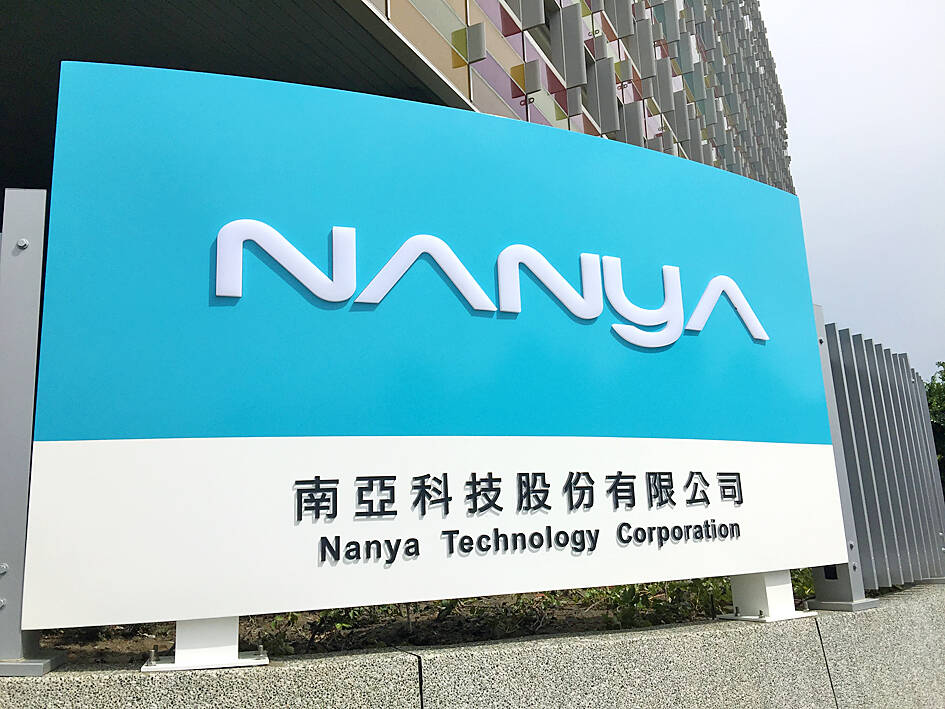Nanya Technology Corp (南亞科技) shares rallied nearly 4 percent during early trading yesterday amid optimism that the nation’s biggest DRAM chipmaker would benefit from China’s latest ban on purchasing memory chips from Micron Technology Inc.
The restrictions are widely considered a result of an escalating technology dispute between the US and China.
Chinese firms might shift orders to non-US suppliers such as Nanya Technology and South Korean memory chipmakers Samsung Electronics Co and SK Hynix Inc.

Photo: Grace Hung, Taipei Times
The Cyberspace Administration of China on Sunday night said that its review found that Micron’s memory chips pose serious network security risks to the country’s critical infrastructure supply chains, affecting China’s national security, the agency said in a statement on its Web site.
To safeguard its national security, Beijing said China’s major information and infrastructure operators should stop buying Micron products.
Chinese companies would be barred from using Micron’s memory chips in servers and data centers, it said.
“Based on our observation, about 10 percent of Micron’s revenue will be affected, if Micron lost all orders of DRAM and NAND memory chips for networking, servers and cloud devices, as well as all local government clients,” Taipei-based market researcher TrendForce Corp (集邦科技) said in an e-mail.
“Overall, the restrictions will not lead to any major changes in the landscape of the world’s memory chip industry. It will not alter the current supply-demand dynamics,” TrendForce said. “Production in China accounts for only a small portion of Micron’s total production. Chinese business also makes up a minor part.”
If Micron’s Chinese clients turn to non-US memory chip suppliers to make up for the shortfall, the cut for each supplier would be minimal, given the small pie, TrendForce said.
“We do not expect any drastic changes to happen to the memory chip industry,” it said.
Nanya Technology makes about 60 to 70 percent of its revenue from DRAM chips used in consumer electronics such as televisions, set-top boxes, network devices and vehicles.
Nanya Technology is relatively new to the server DRAM chip business, which only constituted 6 to 8 percent of its revenue last quarter.
Shares of Nanya Technology closed up 0.29 percent at NT$70.10 in Taipei trading yesterday, while shares of Powertech Technology Inc (力成科技), which provides memory chip testing and packaging services in China for Micron, dipped 1.15 percent to NT$94.90.

STEEP DECLINE: Yesterday’s drop was the third-steepest in its history, the steepest being Monday’s drop in the wake of the tariff announcement on Wednesday last week Taiwanese stocks continued their heavy sell-off yesterday, as concerns over US tariffs and unwinding of leveraged bets weighed on the market. The benchmark TAIEX plunged 1,068.19 points, or 5.79 percent, to 17,391.76, notching the biggest drop among Asian peers as it hit a 15-month low. The decline came even after the government on late Tuesday authorized the NT$500 billion (US$15.2 billion) National Stabilization Fund (國安基金) to step in to buoy the market amid investors’ worries over tariffs imposed by US President Donald Trump. Yesterday’s decline was the third-steepest in its history, trailing only the declines of 2,065.87 points on Monday and

TAKING STOCK: A Taiwanese cookware firm in Vietnam urged customers to assess inventory or place orders early so shipments can reach the US while tariffs are paused Taiwanese businesses in Vietnam are exploring alternatives after the White House imposed a 46 percent import duty on Vietnamese goods, following US President Donald Trump’s announcement of “reciprocal” tariffs on the US’ trading partners. Lo Shih-liang (羅世良), chairman of Brico Industry Co (裕茂工業), a Taiwanese company that manufactures cast iron cookware and stove components in Vietnam, said that more than 40 percent of his business was tied to the US market, describing the constant US policy shifts as an emotional roller coaster. “I work during the day and stay up all night watching the news. I’ve been following US news until 3am

Six years ago, LVMH’s billionaire CEO Bernard Arnault and US President Donald Trump cut the blue ribbon on a factory in rural Texas that would make designer handbags for Louis Vuitton, one of the world’s best-known luxury brands. However, since the high-profile opening, the factory has faced a host of problems limiting production, 11 former Louis Vuitton employees said. The site has consistently ranked among the worst-performing for Louis Vuitton globally, “significantly” underperforming other facilities, said three former Louis Vuitton workers and a senior industry source, who cited internal rankings shared with staff. The plant’s problems — which have not

TARIFF CONCERNS: The chipmaker cited global uncertainty from US tariffs and a weakening economic outlook, but said its Singapore expansion remains on track Vanguard International Semiconductor Corp (世界先進), a foundry service provider specializing in producing power management and display driver chips, yesterday withdrew its full-year revenue projection of moderate growth for this year, as escalating US tariff tensions raised uncertainty and concern about a potential economic recession. The Hsinchu-based chipmaker in February said revenues this year would grow mildly from last year based on improving supply chain inventory levels and market demand. At the time, it also anticipated gradual quarter revenue growth. However, the US’ sweeping tariff policy has upended the industry’s supply chains and weakened economic prospects for the world economy, it said. “Now